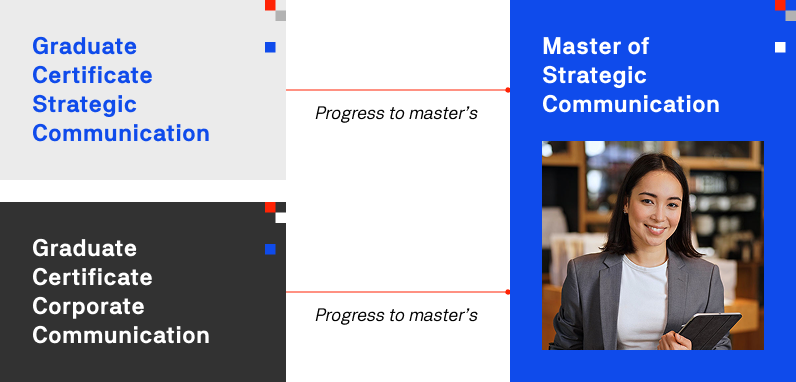Why study the Graduate Certificate in Strategic Communication with UTS Online?
Top 100 University Globally1
Top 5 in Australia for Communication and Media Studies2
5th in Australia for Sustainability3
100% online with support from enrolment through to graduation
1QS World University Rankings, 2026. 2QS World University Rankings by Subject, 2024. 3QS Sustainability Rankings, 2025
Develop the foundation to influence change through communication
Embark on a transformative journey with UTS Online's Graduate Certificate in Strategic Communication. Gain an essential understanding of the forces driving human connection and develop the foundation to influence change through communication.
Learn how to apply key theories and concepts from contemporary practice to achieve business or organisational goals. Equip yourself with skills in intercultural communication and driving effective stakeholder engagement. Obtain know-how in digital and emergent communication practices and delivering multimodal integrated communication campaigns.
Experience the convenience of 100% online delivery, with regular intakes every two months, allowing you to balance your personal and professional commitments.
Who is this course for?
The Graduate Certificate in Strategic Communication is suitable for:
- Corporate communication professionals looking to refine their skills in media relations, stakeholder engagement and brand management.
- Public relations specialists aiming to enhance their expertise in crisis communication, reputation management and storytelling.
- Marketing and digital communication professionals seeking to develop strategic messaging that aligns with brand and business objectives.
- Government and policy advisors who need to communicate complex information to diverse audiences effectively.
- Professionals transitioning into strategic communication roles who want to build expertise in audience engagement, media strategy and campaign execution.
See entry requirements under course information for more eligibility information.
What you will study
The UTS Online Graduate Certificate in Strategic Communication comprises four online subjects (24 credit points [CP] in total).
Complete all of the following subjects:
- Understanding Communication in Society
- Intercultural and International Communication
- Emergent Communication Practices
- Driving Stakeholder Engagement
Note: Most UTS Online subjects are valued at 6 credit points each. For detailed subject descriptions and further information, please download a course guide.
Flexible course options
The Graduate Certificate in Strategic Communication comprises 4 online subjects (24 credit points (CP) in total).
Students who complete the Graduate Certificate in Strategic Communication may qualify to advance to the Master of Strategic Communication, requiring only 8 additional subjects to complete the Master's degree.
Graduate Certificate
4 Subjects | 8 months
Or continue studying
Master's
+8 Subjects | 2 Electives | 24 months
Graduate with a Master's degree
One of our Student Enrolment Advisors can assist you with more information, including alternative pathways.
Study pathways
The Faculty of Arts and Social Sciences offers 2 online Graduate Certificate courses to support your career in communications.
The Graduate Certificate in Strategic Communication and the Graduate Certificate in Corporate Communication both provide a pathway to the Master of Strategic Communication.
This allows you to tailor your studies to align with your career goals and develop specialist skills in the areas of communication that matter most to you.
Learning outcomes
Develop strategic communication solutions
Apply theoretical and technical knowledge to create and evaluate communication strategies that address contemporary organisational challenges. Use multi-platform approaches to enhance audience engagement and brand reputation.
Communicate with cultural awareness and inclusivity
Recognise and navigate diverse cultural, social and professional communication environments. Develop strategies that foster inclusivity, equity and ethical engagement with global and Indigenous communities.
Think critically and solve communication challenges
Critically analyse communication models and synthesise complex information across various media channels. Use strategic thinking and creativity to craft messaging that resonates with diverse audiences.
Engage and influence stakeholders through effective communication
Refine your ability to communicate clearly and persuasively across written, verbal and digital formats. Build relationships with key stakeholders through ethical, impactful and audience-centred communication.
Course information
Entry requirements
Applicants must have one of the following:
- Completed Australian bachelor's degree or higher qualification, or overseas equivalent, in any field of study
OR
- Completed an Australian advanced diploma or associate degree, or overseas equivalent, and a minimum of two years full-time, or equivalent part-time, relevant post-secondary professional work experience#
OR
- A minimum of 4 years full-time or equivalent part-time, relevant post-secondary professional work experience# AND a general capacity to undertake tertiary education
#Relevant professional work experience refers to any professional work experience in which an applicant has developed skills, knowledge, and competencies directly related to supporting strategic communication activities. This includes roles such as managers, professionals, technicians, community, personal service, clerical, administrative, or sales workers across various industries.
Supporting documentation to be submitted with the application
For applicants who need to demonstrate professional work experience:
- Curriculum Vitae AND Statement of service in one of the following formats:
- A 'Statement of Service' provided by the employer
- A completed 'UTS statement of service’ signed by the employer
- A statutory declaration confirming professional work experience (Australian residents only)
- An official letter from the applicant’s accountant or solicitor, on company letterhead, confirming the applicant’s professional work experience or engagement with the business, duration of operations, and nature of the business
- A business certificate of registration in original language and English (e.g. provision of ASIC documentation or ABN or similar documentation for Australian Businesses)
Eligibility for admission does not guarantee an offer of a place.
Want to check your eligibility?
Not only do we have the right tools and support teams to help you – we have people who care about your success.
Career outcomes
The UTS Online Graduate Certificate in Strategic Communication provides foundational knowledge and skills for professionals looking to advance or transition into strategic communication roles. This course prepares you to craft and deliver effective communication strategies.
Upon completion, graduates can pursue roles such as:
- Communication Officer
- Public Relations Coordinator
- Digital Content Strategist
- Corporate Communications Assistant
$96,000
Average starting salary
Professionals in Communications and Public Relations in Australia earn an average starting salary of approximately $96,000 per year, highlighting the competitive compensation in the corporate communications sector.
(Talent.com)
13.3% Projected employment growth in the next 5 years
According to Jobs and Skills Australia, employment for Public Relations Professionals is projected to grow by 13.3% over the next five years, significantly outpacing the average growth rate and highlighting the growing value of strategic communication skills in the current market.
(Jobs and Skills Australia)
6,000 + job
listings across Australia
As of October 2025, there are over 6,065 job listings for 'Strategic Communication and Engagement' roles across Australia, indicating a robust demand for professionals in this field.
(Seek)
Upcoming intakes
UTS Online courses have 6 intakes per year. The diagram below shows all upcoming intakes. Our next intake is highlighted below.
-
Jan
2026 -
Mar
2026 -
May
2026 -
Jun
2026 -
Aug
2026 -
Oct
2026
Meet our Course Director
“With an increasing number of jobs in business, Government and the community/charity sectors all requiring skills in managing and implementing communication activities, we have created a program that introduces people to the skills and knowledge they will need to deliver strategic communication activities as their career progresses. This Graduate Certificate program gives students a different learning experience and helps to prepare them to thrive in the communication environment now, and into the future.”
Dr Andrew McCowan
Course Director, Master of Strategic Communication
Download a course guide
Download a course guide to explore detailed subject descriptions, entry requirements, pathway options and fee information.
Frequently asked questions
The Graduate Certificate in Strategic Communication prepares you for roles such as Public Relations Officer, Communications Manager, Media Advisor or Engagement Officer. Graduates can find opportunities in communication agencies or 'in-house' positions across corporate, government, and non-profit sectors.
Yes, the demand for careers in communication is significant and growing. For example, jobs in Marketing & Advertising are projected to grow by 21.7% and roles in Public Relations have increased by 15.8%. This growth highlights the value of a career in communication and the opportunities it offers.
A strategic communication degree can lead to roles such as communication advisor, corporate affairs specialist, public relations strategist, campaign lead, stakeholder engagement officer or digital communication specialist. These roles are common across government, corporate, nonprofit and consulting sectors, where organisations need people who can analyse audiences, shape messaging and support effective communication strategy.
The UTS Online Graduate Certificate in Strategic Communication helps build the foundational strategic and analytical skills required for these roles, supporting professionals who are beginning their communication career or strengthening their capability within their current organisation.
At UTS Online, your success is our priority, and that doesn't change when you study remotely. We're committed to providing you with a comprehensive range of student support services, guiding you from enrolment right through to graduation.
As a UTS student, you'll enjoy access to an array of support services, including:
-
Your own dedicated Student Success Advisor, available to answer any course-related questions you may have to keep you on track
-
UTS Career Hub for work experience and networking opportunities
-
Assignment writing and academic support from teachers & lecturers
-
Peer learning support
-
Confidential medical and mental health services.
Connect with us to learn more about how we support your success while studying for a Graduate Certificate in Strategic Communications at UTS Online.
When studying the Graduate Certificate in Strategic Communications, your online study experience includes:
-
Modules on strategic communication tools and techniques
-
Case studies for applying learning in practical scenarios
-
Academic and peer support throughout your studies
Here’s a video example showcasing key features of our online learning platform, including tools designed to enhance your study experience.
For practical tips on balancing your studies with work and life, click here to learn how to achieve your goals. Remember, our team is just an email or call away to support you every step of the way.












